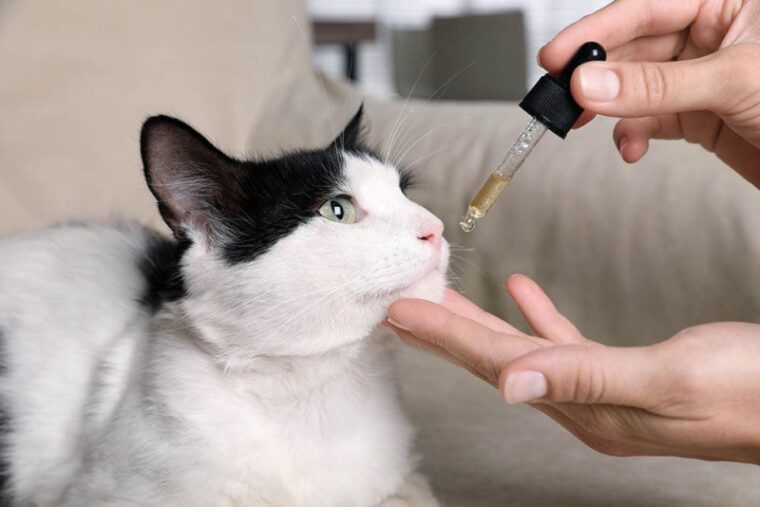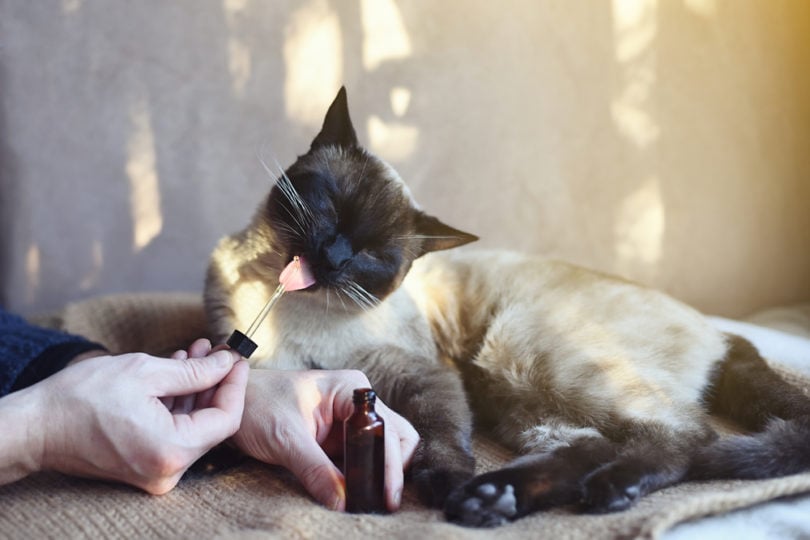
You’ve probably heard a few of your friends or family members talking about trying out CBD oil to ease pain, mental health conditions, and insomnia. This plant-based substance is used by pet owners around the world as an alternative treatment.
However, very little research has been done on its effect on cats, and your cat can experience negative side effects if they overdose on CBD oil. These effects can be minor or much more serious, and your cat can overdose on CBD oil if you give your cat a very high dosage. If you’re interested in starting your cat on CBD oil, keep reading to know how to care for them best.
What Is CBD Oil?
CBD stands for Cannabidiol. It’s extracted from Cannabis sativa or hemp plants. There are over 100 cannabinoids and around 500 chemical compounds contained in the plant. CBD is different from THC, which is also found in Cannabis plants. Unlike THC, CBD is not psychoactive and is thought to have therapeutic benefits.
CBD oil with less than 0.3% THC is legal to use for health purposes in the US. However, some states only allow CBD to be used by those with a prescription and the Federal and State Laws surrounding its use are complex. You will need to be sure of the legality of a product if you are considering using it. Consult your cat’s vet before starting them on CBD oil, as it can interfere with their other treatments and to date has no proven benefits.

What Are the Benefits of CBD Oil for Cats?
The effects that CBD oil will have on your cat according to anecdotes are numerous, but all cats react differently, with some experiencing great improvements and others only slight ones, and others still having side effects.
CBD oil is said to help with a variety of health problems that your cat might be struggling with, such as anxiety, seizures, inflammation, pain, chronic GI issues, and lack of appetite.
However, keep an open discussion with your vet as they’re a medical professional and have placed your cat on certain medications for a reason.
The difficulty is that there are no large scale studies proving safety and efficacy of CBD and therefore proposed benefits are based on anecdotal evidence and human studies.
What Are the Dangers of CBD Oil for Cats?
Unfortunately, CBD oil in cats is still quite new and hasn’t undergone much research, but more interest has been placed on the substance, and studies are underway. However, due to the lack of information on the treatment, there is uncertainty around it.
The CBD oil can also cause interference with the treatment your vet has already placed your cat on, especially if your cat suffers from seizures. Pet owners may stop other medications because they think CBD oil is all their cat requires and cause unintentional serious and potentially fatal harm to their cat.
There are many products on the market trying to make money from the growing popularity of CBD oil, but not all are well made. During recent sample testing, almost no CBD products were found to contain the amount claimed on the label. This makes it difficult to be sure what and how much you are giving to your cat as these products are not regulated like medicine would be.

Some poor-quality CBD oils contain traces of toxins such as yeast, bacteria, mold, and heavy metals, and more THC. These can cause side effects in your cat. Unfortunately, the high-quality options that are safer for your cat are often quite expensive. It is recommended to buy CBD oil that is organic and has a lab analysis indicating the level of CBD and THC in it. It’s important to know where the CBD comes from and to look for varieties grown within the USA.
Sometimes your cat may react differently to the treatment and become lethargic or have an upset stomach. It can often be related to how abruptly you added it to their diet, but you should chat to your vet if you see any unusual behavior.
Overdosing on CBD Oil
Unintentionally giving your cat the wrong dosage of CBD oil can also cause issues. Humans and cats require different amounts according to their sizes, and if you give your cat more than they require, they can become sick. The effective and safe dosages for cats are not well established.
You’ll know if your cat got into the CBD oil while you weren’t looking or if you gave too high a dosage because they’re likely to lose their appetite and experience lethargy, diarrhea, and vomiting. Very large amounts can lead to poor muscle control, and your cat may struggle to walk, jump, eat, and do simple tasks. However, it often subsides fairly quickly, and your cat should go back to normal after some time. Phone your veterinarian or pet poison helpline for advice.
If your cat has ingested CBD oil with a high THC level, their senses may become heightened, and you’ll notice the skin on their back twitch. They’ll also become distressed and agitated. They may leak urine and not be able to make it to their litter box, or they may become very tired and sleep for unusually long periods.
Treatment for an upset stomach will be given to cats with milder symptoms to help ease the discomfort. But if their symptoms are more severe, your vet will likely give them fluid through IV, along with other care.

Conclusion
CBD oil is an increasingly popular supplement for cats with certain health conditions. Pet owners feel it may be a natural way of easing pain, discomfort, and anxiety. Of course, there are also risks, and your cat can overdose on CBD oil. Discuss your options with your veterinarian before starting CBD and never stop any medications without talking to your vet first.
Featured Image Credit: New Africa, Shutterstock






